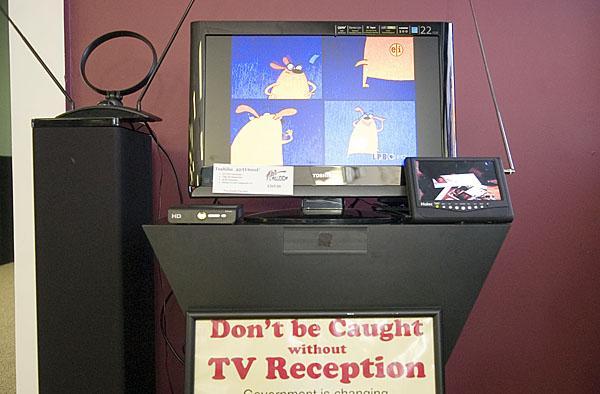A clearer picture is imminent for television viewers using an antenna to receive public broadcast TV signals.Television stations nationwide will discontinue analog broadcasting Friday morning to broadcast only digital transmissions, by mandate of the Digital Television Transition and Public Safety Act of 2005.”The switch to digital broadcasting has been going on for over two decades,” said Mark Wigfield, FCC spokesman. “Digital is much more advanced.”Wigfield said digital broadcasting uses the electromagnetic spectrum more efficiently — freeing up airways for first responders and mobile units — and broadcasts in high-definition and surround sound.With the transition, viewers with analog television sets have three options: Buy a digital converter box, buy a digital TV or subscribe to a cable or satellite service. The government is offering up to two coupons per household, redeemable for two $40 digital converter boxes.Bart Forbes, Nation Telecommunications and Information Administration spokesman, said coupons are available until July 31, or until supplies last. According to the NTIA, more than 59 million coupons have been requested and more than 30 million have been redeemed.Wigfield said the transition was initially funded with $490 million from the national budget, but $650 million was allotted for the transition by the American Recovery and Reinvestment Act of 2009.Forbes said the government is auctioning off the free space on the electromagnetic spectrum to repay the $490 million from the national budget.The FCC received $65 million, but requested another $9.5 million to help fund the call center, Wigfield said.The original deadline for the switch, Feb. 17, was pushed back by President Barack Obama to June 12 because of a high number of unprepared households.About 5.8 million households were unprepared for the transition as of Feb. 1, according to Nielsen Media Research ratings. The number was cut to 3.1 million, or 2.7 percent of households, by June 3.”We’ve certainly cut the number in half since December,” Wigfield said. “We’re slowly getting better.”According to Nielsen, New Orleans ranks 36th out of 59 metered markets for unprepared households, with 1.95 percent of the households still unprepared.Jasmine Kennerson, biological science senior, said she doesn’t agree with the transition.”I think it should be a personal choice to receive analog or digital,” she said. “It’s a lot of trouble for me to have to go the extra mile to receive television, especially as a college student.”Kennerson said she plans to buy a new TV, because buying a converter box is “more trouble than it’s worth.”Mike’s Audio in Baton Rouge has sold more than 1,200 converter boxes.”In the beginning, we saw a lot of government vouchers,” said Mike Rusk, president of Mike’s Audio. “But some people just pay for the converter boxes out of pocket.”Many low-income households cannot afford new TVs so they are relying on converter boxes to watch television, Rusk said.Rusk said digital converter boxes are still popular with customers buying digital TVs.”We’ll watch TV on cable or satellite [at home], but we might go to the hunting camp,” he said. “People still have working TVs at hunting camps or other places that still work and they don’t want to throw away.”Cindy Wu, environmental management senior, said she is well informed of the transition but will not be affected because Cox Cable is provided by her apartment.”There are ads everywhere,” she said. “If I didn’t have cable, I think I would buy a new TV. If you have an older analog TV, it’s probably time to buy a new one anyway.” —-Contact Steven Powell at spowell@lsureveille.com
Switch to digital broadcasting to happen Friday
June 11, 2009

Mike’s Audio on Airline Highway offers the digital conversion box, below the TV. The antenna that goes with the conversion box is pictured to the left.



